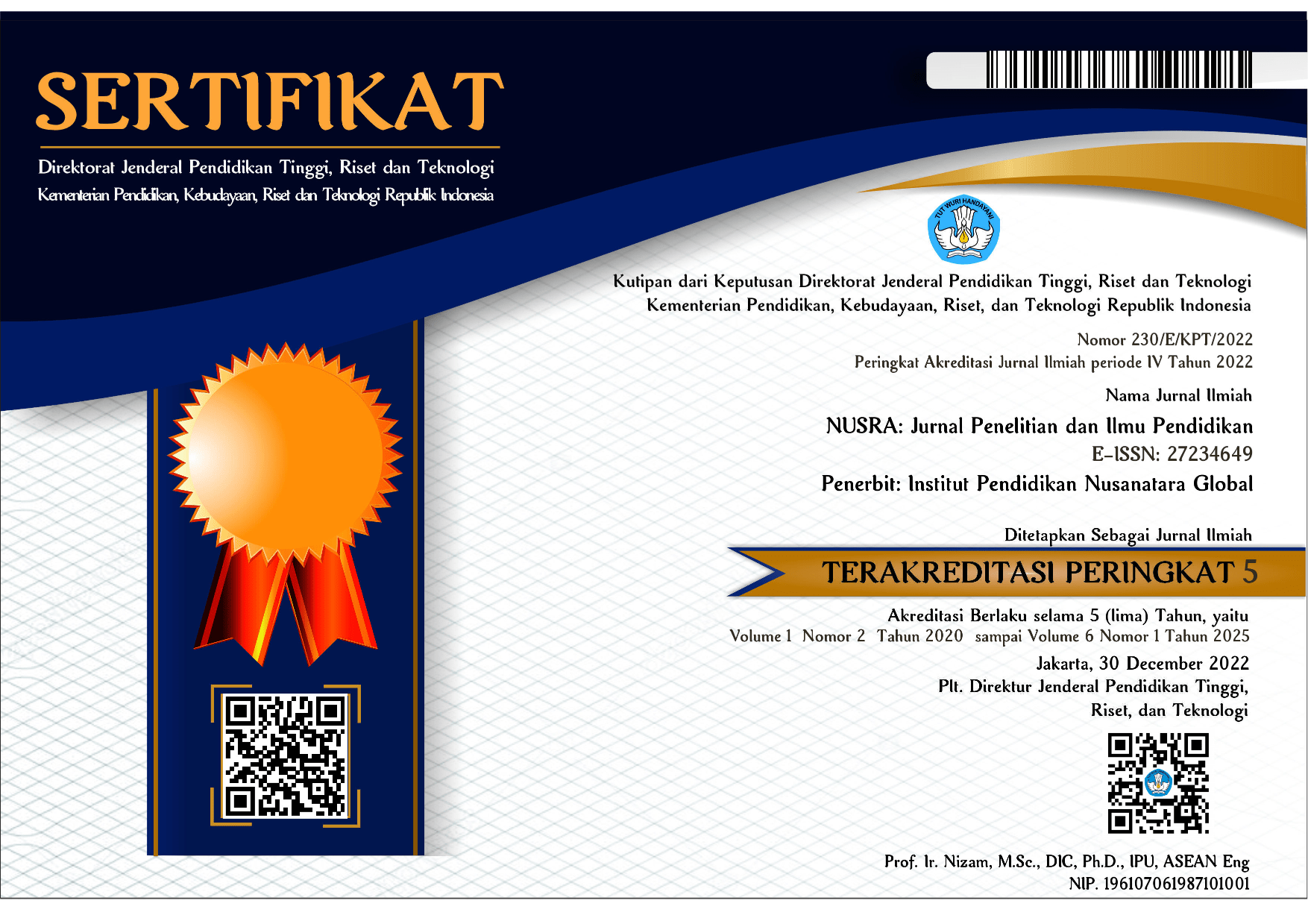BUDAYA POPULER DALAM NOVEL KAMI (BUKAN) SARJANA KERTAS KARYA J.S. KHAIREN (SOSIOLOGI SASTRA)
DOI:
https://doi.org/10.55681/nusra.v4i1.495Keywords:
Popular Culture, Hedonism, MaterialismAbstract
This study aims to determine the form of popular culture of hedonism and materialism contained in the novel Kami (Not) Sarjana Kertas by J.S Khairen in terms of the sociology of literature. Qualitative research with the object of study is a novel with the title "We (Not) Paper Graduates" by J.S Khairen. The data collection method was obtained from the document technique with the text in the novel Kami (Not) Sarjana Kertas. The results of the study are as follows: First, popular culture in the form of hedonism consists of three forms, namely 1) prioritizing momentary pleasures; 2) contemporary lifestyle; and 3) the use of modern technology. Second, the popular culture of materialism consists of three, namely 1) the material possession of wealth; 2) activities that generate money; and 3) the assumption that money is everything.
Downloads
References
Ardia, V. (2014). Drama Korea dan Budaya Popular. Jurnal Komunikasi, 2(3), 1–2.
Aulia, B. (2019). Hedonisme dalam Novel Antologi Rasa Karya Ika Natassa: Kajian Semiotik Roland Barthes. Prosiding Seminar Nasional Linguistik Dan Sastra (SEMANTIKS) 2019, 135–143.
Belk, R. W. (1985). Materialism: Trait Aspects of Living in the Material World. 12, 113–127. https://doi.org/http://dx.doi.org?10.1086/208515.
Gem, C. (1993). Pengertian Hedonisme. Erlangga.
Kasser, T., Rosenblum, K. L., Sameroff, A. J., Deci, E. L., Niemiec, C. P., Ryan, R. M., Árnadóttir, O., Bond, R., Dittmar, H., & Dungan, N., & Hawks, S. (2014). Changes in materialism, changes in psychological well-being: Evidence from three longitudinal studies and an intervention experiment. Motivation and Emotion, 38, 1–22. https://doi.org/doi: 10.1007/s11031- 013-9371-4
Kasser, T. (2002). The High Price of Materia- lism. MA: The MIT Press.
Khairen. (2019). Kami Bukan Sarjana Kertas. Bukune.
Mandeville, A. (2001). Sex, Love And Hedonism. Summersdale Publishers.
Richins, D. (1992). A Consumer Values Orientation for Materialism and Its Measurement: Scale Development and Validation. Journal of Consumer Research, 19, 303–316. https://doi.org/http://dx.doi.org/10.1086/209304
Saputra, R. (2014). Representasi Budaya Populer Dalam Novel Anak B-Jell Cheers Karya Thalia Salsabilla (Tinjauan Sosiologi Sastra). Jurnal Bahtera Sastra Indonesia, 2(2). https://ejournal.upi.edu/index.php/BS_Antologi_Ind/article/view/638.
Stebbins, R. A. (2017). Leisure Activities in Context: A Micro-Macro/Agency-Structure Interpretation Of Leisure. Transaction.
Strinati, D. (2010). Popular Culture: Pengantar Menuju Teori Budaya Populer. Ar-Ruzz Media.
Veenhoven, R. (1989). Conditions Of Happiness. Reidel Publishing Company.
Veenhoven, R. (2003). Hedonism and Happiness. Journal of Happiness Studies, 4(4), 437–457. https://doi.org/https://doi.org/10.1023/B:JOHS.0000005719.56211.fd
Wellek,R. & Warren, A. (1993). Teori Kesusasteraan. Gramedia Pustaka Utama.
Downloads
Published
How to Cite
Issue
Section
License
Copyright (c) 2023 Agoes Hendriyanto, Muhamad Devi Hendriyansyah, Eny Setyowati

This work is licensed under a Creative Commons Attribution-NonCommercial-ShareAlike 4.0 International License.














